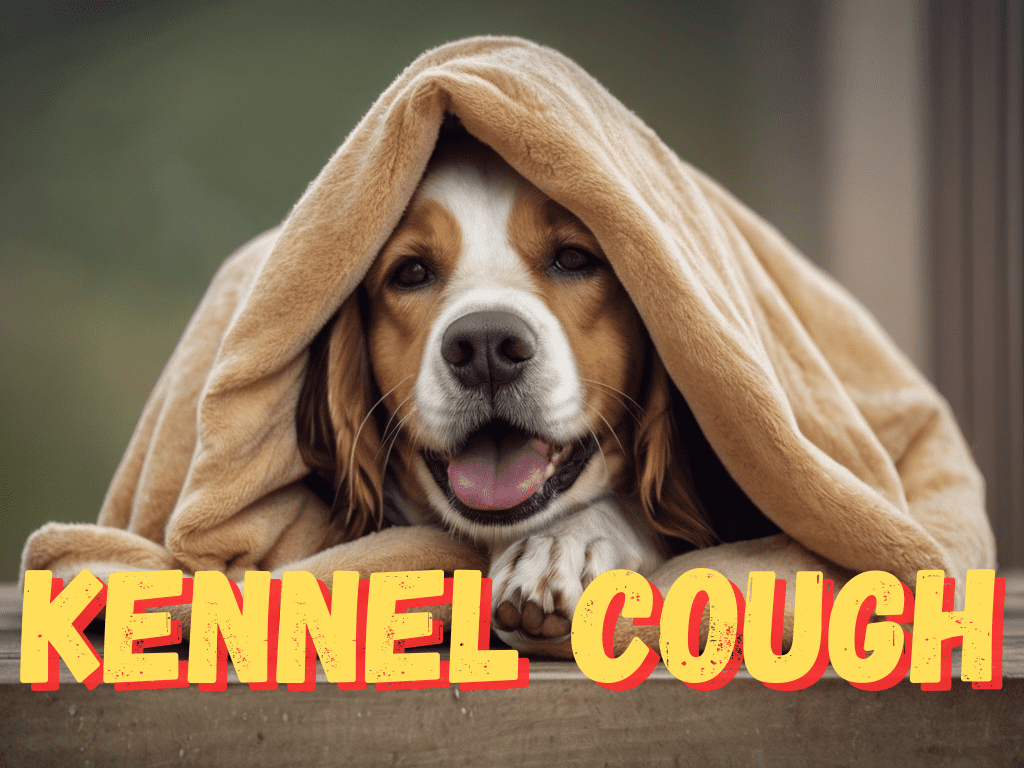Ever heard your dog cough like a honking goose? It might be kennel-cough, a common illness in dogs. This condition is highly contagious and can be a significant concern for dog owners. It’s especially true for those who often take their dogs to crowded places or board them.
But what is kennel cough, and how can you help your dog? Let’s dive into the details.

Table of Contents
Key Takeaways
- Kennel cough is a highly contagious respiratory illness in dogs caused by the Bordetella bronchiseptica bacteria and other viruses.
- Common symptoms include a persistent, hacking cough that often resembles the honking of a goose, along with nasal discharge and lethargy.
- Kennel-cough is typically treated with antibiotics and supportive care, but prevention through vaccination is crucial to protect your furry friend.
- Maintaining proper hygiene and isolating infected dogs can help control the spread of kennel cough outbreaks in pet boarding facilities and other communal settings.
- Understanding the causes, symptoms, and management of kennel-cough can help you keep your dog healthy and happy.
Understanding Kennel Cough: A Canine Respiratory Infection
Kennel cough, also called canine infectious tracheobronchitis, is a prevalent respiratory infection in dogs. It’s caused by both bacteria and viruses. This makes it a big concern for pet owners and vets.
What is Kennel Cough?
Kennel cough refers to a group of pathogens that cause inflammation in a dog’s upper respiratory tract. The main culprits are Bordetella bronchiseptica bacteria and viruses like the canine parainfluenza virus, canine adenovirus, and canine coronavirus.
Causes and Risk Factors
Dogs can get kennel cough from touching infected animals or breathing in their secretions. It’s more common in places where dogs are close together, like boarding kennels, dog parks, and daycare. Dogs at higher risk include those:
- Exposed to sick dogs
- Not fully vaccinated
- With a weak immune system
- In poor air quality areas
Knowing what causes kennel cough helps pet owners prevent and manage this common dog illness.

Kennel Cough Symptoms: Recognizing the Signs
Kennel cough, also known as tracheobronchitis, is a common respiratory infection in dogs. It’s important for pet owners to know the symptoms to get their pets the right treatment quickly. Let’s look at the signs to watch for with this doggy cough.
Common Symptoms to Watch For
The main sign of kennel cough is a dry, “honking” cough that doesn’t go away. This cough can happen when the dog exercises, gets excited, or has pressure on its throat. Besides the cough, pet owners might see other signs like:
- Sneezing
- Nasal discharge
- Lethargy
- Decreased appetite
- Mild fever
Some dogs with kennel cough might only show mild signs. If your dog shows any symptoms of kennel-cough, it’s important to see a vet for a check-up and treatment plan.

“Kennel cough is a highly contagious respiratory infection that can be distressing for dogs and their owners. Early recognition of the symptoms is key to providing the necessary care and preventing the spread of the disease.”
Knowing the doggy cough and other canine respiratory infection signs helps pet owners act fast. By staying alert and getting professional advice, you can manage tracheobronchitis well.
Diagnosing Kennel Cough in Dogs
If your dog shows signs of contagious canine cough, see a vet right away. They will check your dog over and might do more tests if needed.
Your vet will listen to your dog’s lungs and look for signs of infection. They might also test for the bordetella vaccine bacteria. This bacteria is the main cause of kennel cough.
- Physical examination of the respiratory system
- Bordetella bacterial culture or PCR test
- Chest X-rays to rule out other respiratory conditions
Your vet might suggest more tests, like chest X-rays, to check for other health issues. These tests help tell if it’s really Kennel-Cough or something else. This ensures your dog gets the right treatment.
“Early diagnosis and proper treatment are crucial for managing contagious canine cough and preventing the spread of the infection to other dogs.”
After finding out what’s wrong, your vet will create a treatment plan with you. With the right care, most dogs with kennel cough get better quickly.
Kennel Cough Treatment Options
Treating kennel-cough often means using antibiotics and supportive care together. Vets might give antibiotics to lessen symptoms and stop other infections. Giving your dog rest, water, and cough medicine also helps it fight the infection and get better faster.
Antibiotics and Supportive Care
Antibiotics are key in treating kennel-cough. They lessen symptoms and stop other infections. Your vet might prescribe antibiotics like doxycycline or amoxicillin for 7-10 days. Along with antibiotics, supportive care is crucial for recovery.
- Provide plenty of rest and quiet time for your dog to recover.
- Ensure your dog stays hydrated by offering fresh, clean water at all times.
- Use a humidifier or take your dog into the bathroom during hot showers to help soothe the respiratory tract.
- Consider using a cough suppressant medication to help reduce the frequency and severity of coughing fits.
Preventative Measures and Vaccination
To protect your dog from kennel-cough, focus on prevention. The kennel cough vaccine is part of regular shots for puppies and adult dogs. Keeping your dog’s shots current lowers the risk of getting this contagious illness.
| Kennel Cough Prevention | Kennel-Cough Treatment |
|---|---|
| Preventative vaccination | Antibiotics and supportive care |
| Proper hygiene and isolation | Cough suppressants |
| Avoiding high-risk environments | Hydration and rest |
Knowing how to treat and prevent kennel-cough helps keep your dog healthy and happy.
Managing and Preventing Kennel Cough Outbreaks
Stopping kennel cough, a common illness in dogs, needs a strong plan. Pet boarding places, where dogs meet, must focus on cleanliness and keeping sick dogs apart. This keeps all the dogs healthy.
Hygiene and Isolation Practices
Cleaning and disinfecting everything, from kennels to common areas, is key to stopping the virus. Staff should wash their hands often and keep sick dogs away from others. Watching dogs for signs of illness and treating them quickly also helps stop the cough from spreading.
Getting dogs vaccinated is very important to prevent kennel-cough. Making sure all boarding dogs have their shots cuts down the risk of outbreaks. Teaching owners about the vaccine and keeping their dogs up-to-date helps keep the place safe and healthy for all dogs.
FAQ
What is kennel cough?
Kennel cough, also known as canine infectious tracheobronchitis, is a common illness in dogs. It’s caused by bacteria and viruses. These cause a cough, sneezing, and other breathing problems.
What are the common symptoms of kennel cough?
Dogs with kennel cough often have a dry, hacking cough and sneeze a lot. They may also have a runny nose, feel tired, and not want to eat. The cough sounds like a “honking” or “goose-like” sound, especially when they’re active or excited.
How is kennel cough diagnosed?
Vets diagnose kennel-cough by listening to the dog’s breathing and cough. They might also do tests like cultures or X-rays to rule out other illnesses.
How is kennel cough treated?
Treatment for kennel-cough includes antibiotics and care to help with symptoms. Dogs may need cough medicine and rest. Most dogs get better in 1-2 weeks with treatment.
How can kennel cough be prevented?
To prevent kennel-cough, vaccinate your dog and keep them clean. Keep sick dogs away from healthy ones. The Bordetella vaccine is key for dogs that go to boarding places or dog parks often.
How can kennel cough outbreaks be managed in pet boarding facilities?
Boarding places should keep things clean and separate sick dogs from healthy ones. They should clean surfaces often and give all dogs the Bordetella vaccine. This helps stop the illness from spreading.






[…] there are many hypoallergenic dog breeds that do well in small spaces and help reduce allergy symptoms. These allergy-friendly dogs are perfect for people who want a pet but don’t want the […]